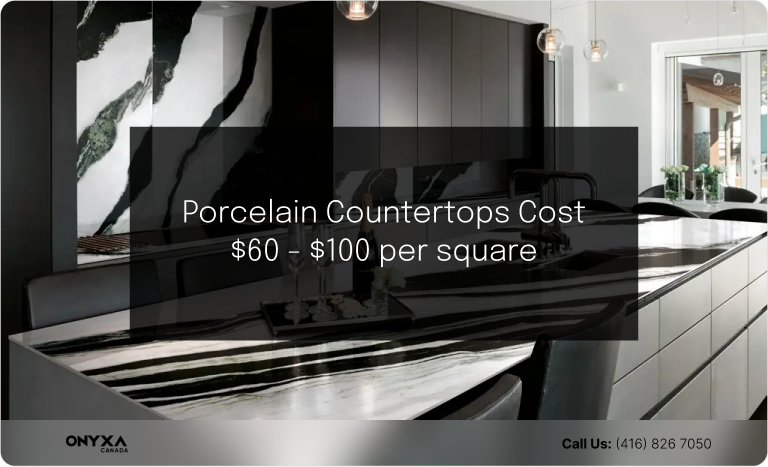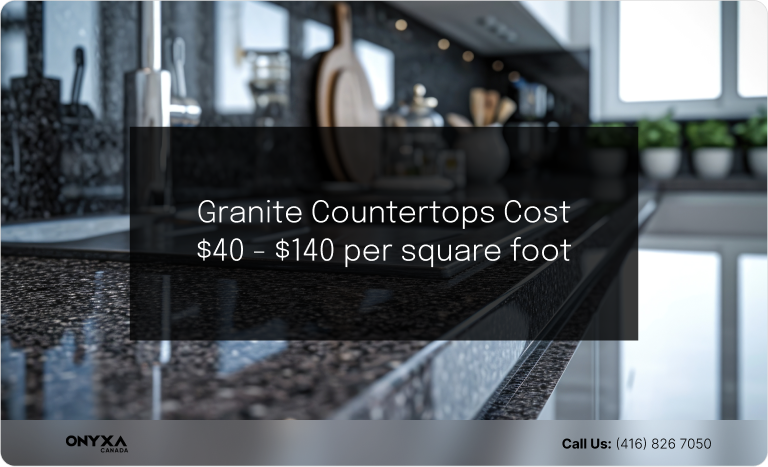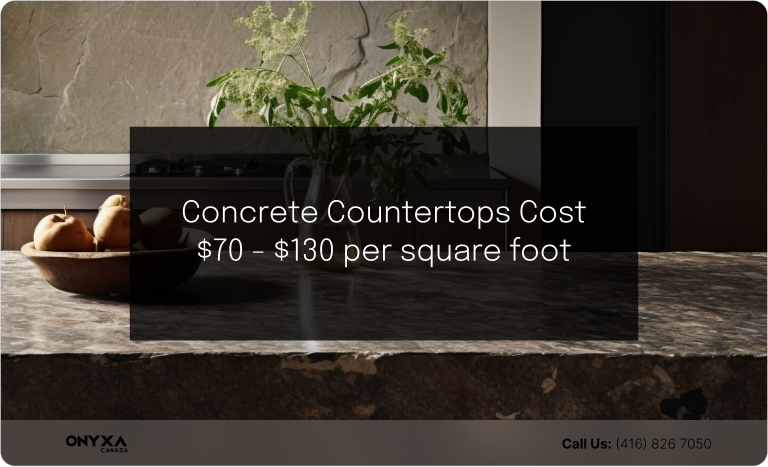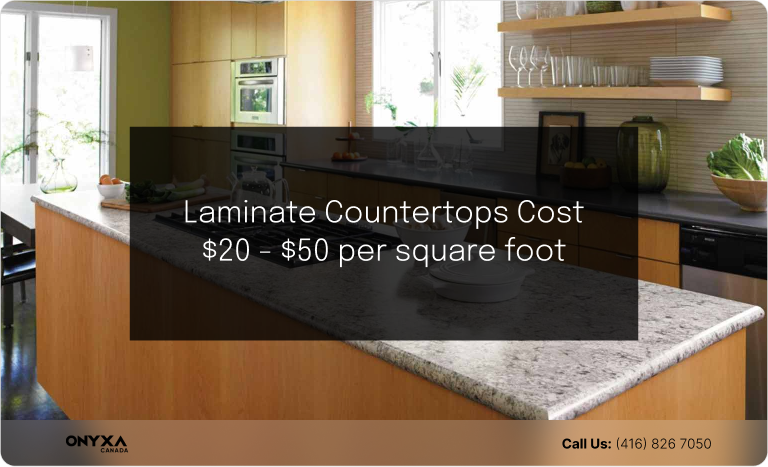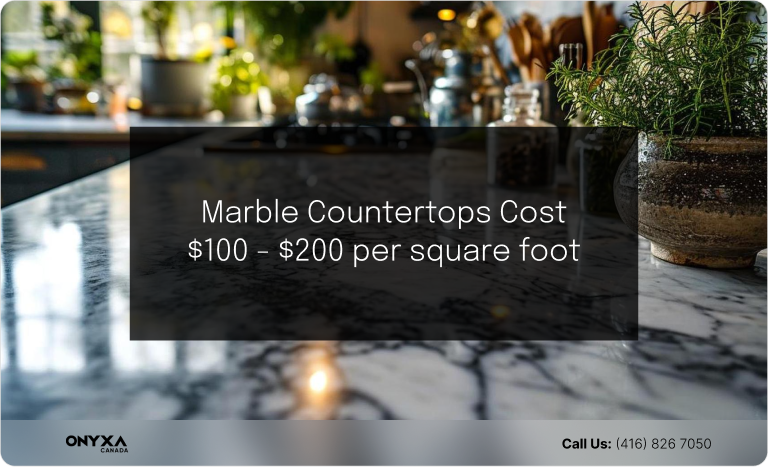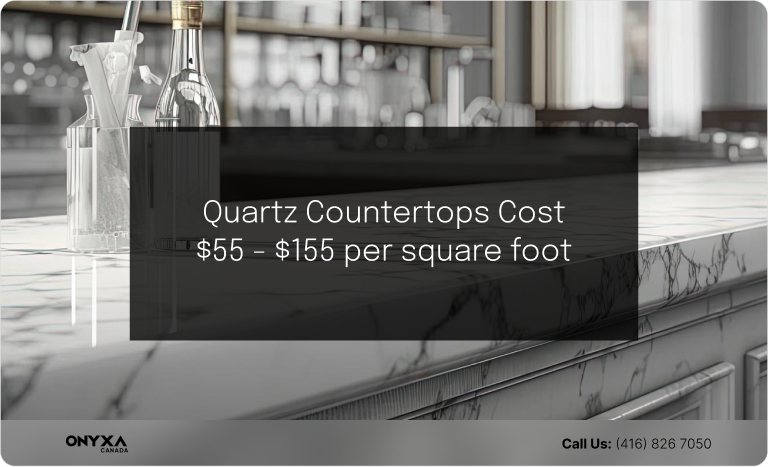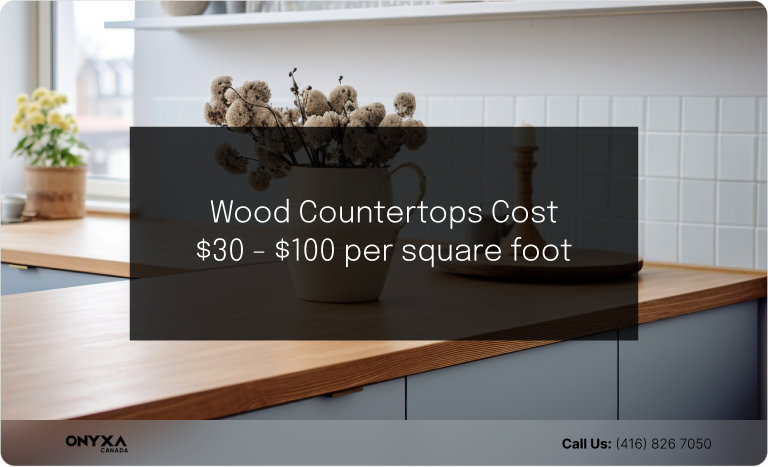Kitchen Countertop Costs
Thinking about giving your kitchen a fresh new look? The right countertop can transform your space and make everyday cooking more enjoyable. Our 2024 guide will help you find the perfect countertop that fits your style, is easy to maintain, and stays within your budget. We’ll explore a variety of materials, with a special focus on porcelain—a popular choice for its durability and stylish appearance. From budget-friendly laminate at $20 per square foot to luxurious marble costing up to $200 per square foot, we’ll cover the costs and benefits of each option. Whether you’re renovating or just curious about your options, this guide has all the information you need to make an informed decision.
Top 7 Popular Kitchen Countertops Cost in 2024
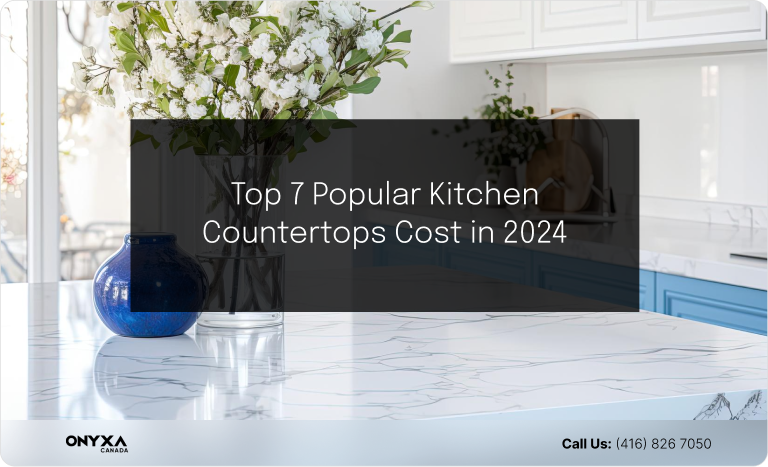
Planning your kitchen renovation for 2024?
Knowing the costs and benefits of different countertop materials can help you make the best choice for your home. Each material has unique features that affect your kitchen’s look, functionality, and long-term value. From the sleek durability of porcelain to the timeless elegance of marble, here’s a closer look at the top seven popular countertop materials and what they offer:
Porcelain Countertops Cost

Cost: $60 – $100 per square foot (installed)
Maintenance Cost: Low (occasional cleaning with soap and water)
Benefits: Porcelain countertops are a great choice if you’re looking for style and durability without breaking the bank. They resist scratches, stains, and heat, making them a practical and long-lasting choice.
Porcelain is also non-porous, so it doesn’t require sealing and is highly resistant to moisture and bacteria, making it a hygienic option for kitchens. This material is available in a wide range of colors and patterns, allowing you to achieve the look of more expensive materials like marble or granite at a fraction of the cost.
Additionally, porcelain is environmentally friendly, often made from recycled materials, and it can withstand heavy use without showing wear and tear. Overall, porcelain countertops offer an excellent balance of aesthetics, durability, and low maintenance.
Granite Countertops Cost

Cost: $40 – $100 per square foot (installed)
Maintenance Cost: Moderate (regular sealing required)
Benefits: Granite countertops bring unique patterns and colors, adding natural beauty to any kitchen. They are durable, resisting scratches and heat, perfect for busy kitchens.
Properly sealed granite is low-maintenance, easy to clean, and resistant to stains and bacteria. It can also handle high temperatures, so you can directly place hot pots and pans on the surface.
Granite countertops can also boost your home’s value and attract buyers. With a variety of colors and patterns, granite fits many kitchen styles. With proper care, granite countertops offer long-lasting beauty and functionality.
Concrete Countertops Cost

Cost: $70 – $130 per square foot (installed)
Maintenance Cost: High (regular sealing and occasional repairs)
Benefits: Concrete countertops offer a modern, customizable look. They can be tailored to your style with various finishes and colors.
This price can vary based on custom finishes and colors, which allow you to tailor the countertops to fit your unique style and kitchen design. While they require maintenance like regular sealing, their unique, industrial aesthetic can make your kitchen stand out.
Laminate Countertops Cost

Cost: $20 – $50 per square foot (installed)
Maintenance Cost: Low (occasional cleaning with soap and water)
Benefits: Laminate countertops are the most budget-friendly option. They come in various designs and colors, and modern laminates can mimic the look of more expensive materials like wood or stone.
However, they are less durable and can be prone to scratches and burns. Laminate is a practical choice for those on a tight budget who want to update their kitchen’s look without spending much.
Marble Countertops Cost

Cost: $100 – $200 per square foot (installed)
Maintenance Cost: High (regular sealing and careful cleaning)
Benefits: Marble is known for its luxury and classic, timeless look that can elevate any kitchen. It is porous and needs regular sealing and careful cleaning to avoid stains and scratches.
While it requires more upkeep, marble’s elegant appearance makes it a popular choice for those who appreciate its beauty and are willing to maintain it.
Quartz Countertops Cost

Cost: $55 – $155 per square foot (installed)
Maintenance Cost: Low (occasional cleaning with soap and water)
Benefits: Quartz countertops are beautiful and durable. As an engineered stone, quartz is non-porous, so it resists stains and scratches without needing sealing.
It comes in many colors and patterns, making it a versatile choice for any kitchen design. Plus, maintenance is easy—just clean with soap and water.
Wood Countertops Cost

Cost: $30 – $100 per square foot (installed)
Maintenance Cost: Moderate (regular oiling and occasional sanding)
Benefits: Wood countertops add warmth and a natural feel to your kitchen. They can be customized to match various styles, from rustic to modern.
While they need regular maintenance, like oiling, they can be sanded and refinished to look new, extending their lifespan.
How to Calculate the Cost of Kitchen Countertops?
By following these 6steps, you can accurately calculate the cost of your new kitchen countertops and ensure that you stay within your budget. Enjoy the process of transforming your kitchen into a beautiful and functional space!
Step1: Measure the Area
Start by measuring the total square footage of your countertops, including any backsplashes.
Use a tape measure to determine the length and width of each section of your countertop.
Multiply the length by the width to get the square footage of each section, then add all the sections together to get the total area.
Accurate measurements will ensure you purchase the right amount of material.
Step 2: Choose Your Material
Decide on the material you want for your countertops. Prices can vary significantly based on the material:
Laminate: The most budget-friendly option, typically costing $20-$50 per square foot.
Quartz and Granite: Higher-end options, usually costing between $55-$155 and $40-$100 per square foot, respectively.
Consider each material’s look, durability, and maintenance needs to find the best fit for your kitchen and lifestyle.
Step 3: Factor in Installation Costs
Installation costs are often included in the price per square foot but can vary depending on the job’s complexity.
If the price doesn’t include installation, ask for an estimate. Installation complexity can be influenced by factors such as countertop size, the number of seams, and whether any existing countertops need to be removed.
Step 4: Include Additional Features
Think about any extra features you might want, as these can add to the overall cost:
Sink Cut-outs: Necessary for fitting sinks into the countertop.
Custom Edges: Decorative edges can enhance the look of your countertop but may come at an additional cost.
Backsplashes: Additional material to cover the area between the countertop and the wall.
Step 5: Get Multiple Quotes
To ensure you get the best deal, obtain quotes from several suppliers. To get accurate comparisons, provide each supplier with the same material, size, and additional features specifications.
This will help you find the most cost-effective option and understand the market rate for your project.
Step 6: Plan for Contingencies
Set aside a contingency budget for any unexpected expenses during installation. This could include extra materials, unforeseen labor costs, or adjustments needed once the project is underway. A good rule of thumb is adding 10-20% of the estimated cost as a buffer.
Cost Comparison and Longevity
Choosing the right kitchen countertop isn’t just about looks—it’s about making a smart investment for your home’s future. It’s important to consider both the initial costs and long-term benefits.
Different materials offer unique advantages in terms of appearance, upkeep, and lifespan. For example, some countertops might be pricier upfront but can save you money over time with less maintenance. Let’s look at how popular countertop materials compare in terms of cost and durability so you can make a well-informed choice.
Design and Aesthetic Impact
Your kitchen countertop can significantly change the feel of your space. It’s not just about picking a color or texture; it’s about setting the mood for the entire room. Countertops come in many materials and finishes, each bringing its own charm.
For instance, quartz offers a sleek, modern vibe, while marble brings timeless elegance. Wood adds a warm, cozy feel to the kitchen. The right countertop material will complement your kitchen’s decor, reflect your personal style, and enhance the overall look.
Consider how each material will blend with your kitchen’s design to create a cohesive and inviting space.
Maintenance and Durability
When choosing kitchen countertops, consider how easy they are to care for and how well they stand up to daily use. Some materials, like quartz and porcelain, are easy to maintain and very durable. They resist stains, scratches, and heat and need only simple cleaning.
In contrast, materials like marble and wood need more attention to stay in good shape; marble requires regular sealing, and wood may need oiling to protect its surface. Choose a countertop that fits your lifestyle and how much time you will spend on upkeep to keep your kitchen looking great for years.
Installation Considerations
The material you choose will affect the installation’s complexity and cost.
Heavy materials like porcelain and granite need professional installation to ensure they are properly supported and fitted, which might cost more initially but ensures quality. Lighter materials like laminate and wood can be more DIY-friendly, potentially saving you money if you’re handy.
Whether you hire a pro or do it yourself, precision is key to a perfect, lasting finish.
Which countertop offers the best value for the cost?
Porcelain stands out when it comes to getting the best value for your money in kitchen countertops.
Porcelain countertops are highly durable, resisting scratches, stains, and heat. They don’t require regular sealing, which reduces maintenance costs. Their non-porous surface makes them hygienic and easy to clean.
Aesthetically, porcelain offers a wide range of colors and patterns, allowing you to achieve the look of more expensive materials like marble or granite at a lower cost.
While initially more expensive than budget options like laminate, the long-term benefits and low maintenance make porcelain a smart investment, providing an excellent balance between cost, durability, and style.
Conclusion
Choosing the right kitchen countertop is a big decision that affects your kitchen’s look and function. Our 2024 guide covers the costs and benefits of various materials, from budget-friendly laminate to luxurious marble.
Porcelain countertops are great for their durability, style, and low maintenance, making them a smart investment. By considering factors like material, installation costs, and upkeep, you can pick a countertop that enhances your kitchen’s beauty and fits your budget. Whether you’re renovating or just exploring your options, we hope this guide helps you make the best choice for your kitchen.
Upgrade your home with the beauty and durability of Onyxa’s porcelain slabs and natural stones. Your luxurious Toronto home is just a selection away. Let’s create something extraordinary together!
Contact us today!
+1 (416) 854-8645
FAQs
What is the most durable countertop material?
- Porcelain and quartz are today’s most durable and maintenance-friendly options. Both materials are highly resistant to scratches, heat, and stains, making them ideal for busy kitchens.
Are there affordable options that still look great?
- Absolutely! Laminate countertops have evolved significantly in design and now can convincingly mimic more expensive materials like wood, stone, or even marble, all at a fraction of the cost.
What is the best countertop for your money?
- Porcelain countertops offer a fantastic balance of value and quality. With its exceptional durability and low maintenance requirements, porcelain provides a high-end appearance without the extensive upkeep needed for natural stone. Non-porous and resilient porcelain countertops come in various colors and patterns, making them an excellent choice for homeowners seeking both practicality and style.
Which countertops last the longest?
- Porcelain countertops, alongside granite and quartz, are typically the frontrunners for longevity. All three materials boast exceptional durability and can withstand the demands of a busy kitchen, lasting for decades with proper care.
What is the most popular kitchen countertop material right now?
- Porcelain and quartz are the top choices for kitchen countertops, prized for their durability and diverse design options. With patterns that mimic natural stone and reflect modern trends, porcelain offers elegance with minimal maintenance, making it ideal for any kitchen. Quartz remains a popular option, valued for its durability and versatile designs. Together, porcelain and quartz provide homeowners with stylish and practical choices for their kitchen countertops.
How do I choose the right countertop color and pattern for my kitchen?
- To choose the right countertop color and pattern, consider your kitchen’s existing color scheme and style, including cabinets, flooring, and appliances. Neutral tones like beige and gray offer versatility, while lighter colors can make small spaces feel more expansive, and darker hues add warmth to larger kitchens. Select a color that complements or contrasts with your existing elements and consider patterns based on whether you prefer a subtle or bold look. Ultimately, trust your instincts and opt for a color and pattern that reflects your style and enhances your kitchen’s overall aesthetic.

